The Sum Of All Kisses
Book 3 in the
Smythe-Smith Quartet
Hugh Prentice has never had patience for dramatic females, and if Lady Sarah Pleinsworth has ever been acquainted with the words shy or retiring, she’s long since tossed them out the window. Besides, a reckless duel has left this brilliant mathematician with a ruined leg, and now he could never court a woman like Sarah, much less dream of marrying her.
Sarah has never forgiven Hugh for the duel he fought that nearly destroyed her family. But even if she could find a way to forgive him, it wouldn’t matter. She doesn’t care that his leg is less than perfect, it’s his personality she can’t abide. But forced to spend a week in close company they discover that first impressions are not always reliable. And when one kiss leads to two, three, and four, the mathematician may lose count, and the lady may, for the first time, find herself speechless…
From #1 New York Times bestselling author, and creator of the Bridgerton series, Julia Quinn presents the third, stunning installment in the Bridgerton adjacent Regency era-set world featuring the romantic adventures of the well-meaning but less-than-accomplished Smythe-Smith musicians. Following a disastrous duel, a dashing mathematician and a headstrong young lady are at odds—until fate throws them together.
 Start Reading Now
Start Reading Now
 Explore Inside this Story
Explore Inside this Story

Books in this series:
Find out more about the Smythe-Smith Quartet →
-
Quinn-tessential Quote
In fanciful novels, the sort Sarah read by the dozen and refused to apologize for, foreshadowing was painted by the bucket, not the brushstroke.
-
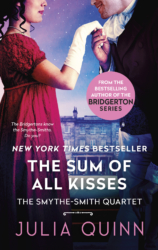
Inside the Story:
JQ’s Author Notes- The Patch of Green (where Daniel and Hugh fight their duel) is not a real location. I really wasn't sure where the men would be most likely to duel, but I wanted it to sound as if there was an infamous spot everyone knew about.
- At the outset of Chapter Two, Sarah and Honoria are talking about Gareth St. Clair, whom some of you might recognize as the hero of It's in His Kiss. This particular scene takes place several years before Gareth meets and falls in love with Hyacinth, so he is still a single (and very eligible) gentleman at the time of Sarah and Honoria's conversation.
- Eloisa James fans will recognize the Duke of Kinross and Lady Edith Gilchrist, who are guests at Marcus and Honoria's wedding. Although neither protagonist from Once Upon a Tower actually appears "on screen" in The Sum of All Kisses, both are mentioned, and Iris's frantic search for Edie leads to some rather significant self-reflection on the part of Sarah.
- Once again, I was unable to resist the lure of Miss Butterworth and the Mad Baron. My favorite novel-within-a-novel makes its fifth appearance in my books in The Sum of All Kisses. It made its debut in It's in His Kiss as one of the books Hyacinth reads to Lady Danbury, then it became a big part of the plots of both What Happens in London and Ten Things I Love About You. I managed to work it into Just Like Heaven, as well. And now it's a graphic novel!
- Oranges and Lemons is an old English nursery rhyme that developed into a singing game similar to (but not exactly like) "London Bridge is Falling Down." The lyrics refer to the bells of churches located in or near the City of London. Perhaps the most famous of these churches is St. Sepulchre-Without-Newgate, which is referred to in the rhyme as "the bells of Old Bailey" due to its location opposite London's Central Criminal Court, commonly known as "Old Bailey." The bells of St. Sepulchre tolled whenever a condemned man was marched from nearby Newgate Prison to the gallows for his execution. Additionally, St. Sepulchre's bellman was responsible for ringing the a large handbell known as the Executioner's Bell inside Newgate at midnight on the day of an execution. Today, the Executioner's Bell resides in a glass case in St. Sepulchre's.
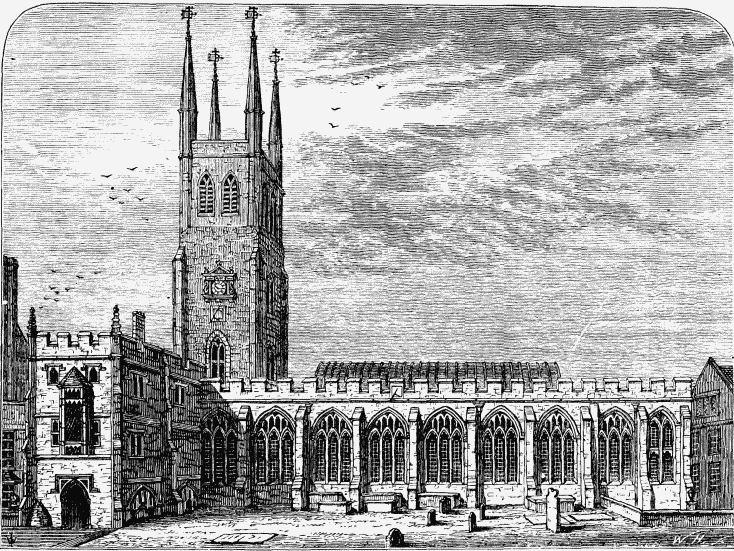
Illustration captioned "ST. SEPULCHRE'S CHURCH IN 1737. (From a View by Toms.)" found in Chapter 55 of "Old and New London: Volume 2," by Walter Thornbury (Originally published: 1878). Original illustrator unknown. Image in the public domain. 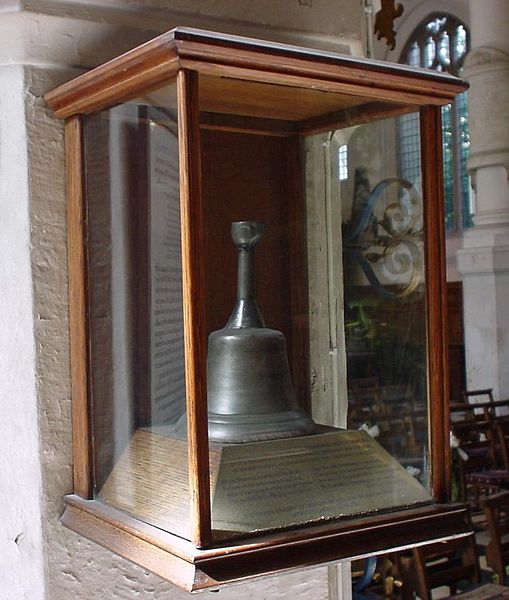
photo: Lonpicman at English Wikipedia., CC BY-SA 3.0, via Wikimedia Commons - Oil of Sweet Vitriol is an old-fashioned word for diethyl ether, more commonly known simply as ether. Ether is one of the oldest known anesthetics; it was first synthesized in 1540 by Valerius Cordus.
- The wealthy usually had their newspapers ironed before they read them. This was not to eliminate wrinkles but rather to seal the ink so that it did not rub off on people's hands.

Bonus Features
Enjoy an Excerpt
from
The Sum Of All Kisses
Prologue
London
Quite late at night
Spring 1820
“Piquet favors those with a vivid memory,” the Earl of Chatteris said, to no one in particular.
Lord Hugh Prentice didn’t hear him; he was too far away, over at the table by the window, and more pertinently, he was somewhat drunk. But had Hugh heard Chatteris’s remark—and had he not been intoxicated—he would have thought:
That is why I play piquet.
He would not have said it out loud. Hugh had never been the sort to speak merely for the sake of making his voice heard. But he would have thought it. And his expression would have changed. One corner of his lips would have twitched, and his right eyebrow might have arched—just the barest hint of a movement, but still, enough for a careful observer to think him smug.
Although the truth was, London society was quite devoid of careful observers.
Except for Hugh.
Hugh Prentice noticed everything. And he remembered it all, too. He could, if he wished, recite all of Romeo and Juliet, word for word. Hamlet, too. Julius Caesar he could not do, but that was only because he had never taken the time to read it.
It was a rare enough talent that Hugh was disciplined for cheating six times during his first two months at Eton. He soon realized that his life was made infinitely easier if he purposefully flubbed a question or two on his examinations. It wasn’t that he minded the accusations of cheating so much—he knew he hadn’t cheated, and he didn’t much care what anyone else thought of it—but it was such a bother, getting hauled up before his teachers and being forced to stand there and regurgitate information until they were satisfied of his innocence.
Where his memory really came in handy, though, was cards. As the younger son of the Marquess of Ramsgate, Hugh knew that he was due to inherit precisely nothing. Younger sons were expected to join the army, the clergy, or the ranks of fortune hunters. As Hugh lacked the temperament for any of these pursuits, he would have to find some other means of support. And gambling was so very easy when one had the ability to recall every card played —in order— for an entire evening.
What had become difficult was finding gentlemen willing to play —Hugh’s remarkable skill at piquet had become the stuff of legend— but if young men were drunk enough, they always tried their hand. Everyone wanted to be the man to beat Hugh Prentice at cards.
The problem was that this evening, Hugh had also drunk “enough.” It wasn’t a common occurrence; he’d never been comfortable with the loss of control that flowed from a bottle of wine. But he’d been out and about with friends, and they’d gone to a somewhat salty tavern, where the pints were large, the crowd was loud, and the women uncommonly buxom.
By the time they’d reached their club and pulled out a deck of cards, Daniel Smythe-Smith, who had recently come into his title as the Earl of Winstead, was well in his cups. He was offering vivid descriptions of the maid he’d just tupped, Charles Dunwoody was vowing to go back to the tavern to improve upon Daniel’s performance, and even Marcus Holroyd —the young Earl of Chatteris who had always been a bit more serious than the others— was laughing so hard he nearly tipped his chair over.
Hugh had preferred his barmaid to Daniel’s —a little less fleshy; a little more lithe— but he just grinned when pressed for the details. He remembered every inch of her —of course— but he never kissed and told.
“Going to beat you this time, Prentice!” Daniel boasted. He leaned sloppily against the table, his signature grin nearly blinding the rest of them. He’d always been the charmer of the group.
“For the love of God, Daniel,” Marcus groaned, “not again.”
“No, no, I can do it.” Daniel wagged a finger in the air, laughing when the motion made him lose his balance. “I can do it this time.”
“He can!” Charles Dunwoody exclaimed. “I know he can!”
No one bothered to comment. Even sober, Charles Dunwoody seemed to know a lot of things that were untrue.
“No, no, I can,” Daniel insisted, “because you” —he wagged a finger in Hugh’s general direction— “have had a lot to drink.”
“Not as much as you have,” Marcus pointed out, but he hiccupped when he said it.
“I counted,” Daniel said triumphantly. “He had more.”
“I had the most,” Dunwoody boasted.
“Then you definitely should play,” Daniel said.
A game was struck, and wine was served, and everyone was having a grand time until—
Daniel won.
Hugh blinked, staring at the cards on the table.
“I won,” Daniel said, with not inconsiderable awe. “Will you look at that?”
Hugh ran through the deck in his mind, ignoring the fact that some of the cards were uncharacteristically fuzzy.
“I won,” Daniel said again, this time to Marcus, his longtime closest friend.
“No,” Hugh said, mostly to himself. It wasn’t possible. It just wasn’t possible. He never lost at cards. At night, when he was trying to sleep, when he was trying not to listen, his mind could bring up every card he’d played that day. That week, even.
“I’m not even sure how I did it,” Daniel said. “It was the king but then it was the seven, and I…”
“It was the ace,” Hugh snapped, unable to listen to another moment of his idiocy.
“Hmmm.” Daniel blinked. “Maybe it was.”
“God,” Hugh cried out. “Somebody shut him up.” He needed quiet. He needed to focus and remember the cards. If he could just do that, this would all go away. It was like the time he’d come home late with Freddie, and their father had already been waiting with—
No no no. That was something different. This was cards. Piquet. He never lost. It was the one thing, the only thing he could count on.
Dunwoody scratched his head and looked at the cards, counting out loud. “I think he—”
“Winstead, you bloody cheat!” Hugh yelled, the words pouring unbidden from his throat. He didn’t know where they came from, or what had prompted him to say them, but once out, they filled the air, sizzling violently above the table.
Hugh began to shake.
“No,” Daniel said. Just that. Just no, with an unsteady hand and a confused expression. Baffled, like—
But Hugh wouldn’t think of that. He couldn’t think of that, and so instead he lurched to his feet, upending the table as he clung to the one thing he knew was true, which was that he never lost at cards.
“I didn’t cheat,” Daniel said, blinking rapidly. He turned to Marcus. “I don’t cheat.”
But he had to have cheated. Hugh flipped through the cards in his mind again, ignoring the fact that the Jack of Clubs was wielding an actual club, and he was chasing after the ten, which was drinking wine out of a glass much like the one currently shattered at his feet…
Hugh started yelling. He had no idea what he was saying, just that Daniel had cheated, and the Queen of Hearts had stumbled, and 42 times 306 was always 12,852, not that he had any idea what that had to do with anything, but there was wine all over the floor now, and the cards were everywhere, and Daniel was just standing there, shaking his head, saying, “What is he talking about?”
“There is no way you could have had the ace,” Hugh hissed. The ace had been after the jack, which had been next to the ten…
“But I did,” Daniel said with a shrug. And a burp.
“You couldn’t,” Hugh shot back, stumbling for balance. “I know every card in the deck.”
Daniel looked down at the cards. Hugh did, too, at the Queen of Diamonds, madeira dripping from her neck like blood.
“Remarkable,” Daniel murmured. He looked straight at Hugh. “I won. Fancy that.”
Was he mocking him? Was Daniel Smythe-Smith, the oh-so venerable Earl of Winstead mocking him?
“I will have satisfaction,” Hugh growled.
Daniel’s head snapped up in surprise. “What?”
“Name your seconds.”
“Are you challenging me to a duel?” Daniel turned incredulously to Marcus. “I think he’s challenging me to a duel.”
“Daniel, shut up,” Marcus groaned. Marcus, who suddenly looked far more sober than the rest of them.
But Daniel waved him off, then said, “Hugh, don’t be an ass.”
Hugh didn’t think. He lunged. Daniel jumped to the side, but not fast enough, and both men went down. One of the table legs jammed into Hugh’s hip, but he barely felt it. He pounded Daniel—one, two, three, four—until two sets of hands pulled him back, up and off, barely restraining him as he spat, “You’re a bloody cheat.”
Because he knew this. And Winstead had mocked him.
“You’re an idiot,” Daniel replied, shaking blood from his face.
“I will have my satisfaction.”
“Oh no you won’t,” Daniel hissed. “I will have satisfaction.”
“The Patch of Green?” Hugh said coolly.
“At dawn.”
There was a hushed silence as everyone waited for either man to come to his senses.
But they didn’t. Of course they didn’t.
Hugh smiled. He couldn’t imagine why he had anything to smile about, but he felt it slinking along his face nonetheless. And when he looked at Daniel Smythe-Smith he saw another man’s face.
“So be it.”
“You don’t have to do this,” Charles Dunwoody said, grimacing as he finished his inspection of Hugh’s gun.
Hugh didn’t bother to reply. His head hurt too much.
“I mean, I believe you that he was cheating. He’d have to be, because, well, it’s you, and you always win. Don’t know how you manage it, but you do.”
Hugh barely moved his head, but his eyes traveled a slow arc toward the other man’s face. Was Dunwoody accusing him of cheating now?
“I think it’s the maths,” Dunwoody went on, oblivious to Hugh’s sardonic expression. “You always were freakishly good at it…”
Pleasant. Always so very pleasant to be called a freak.
“…and I know you never cheated at maths. Heaven knows we quizzed you enough at school.” Dunwoody looked up with a frown. “How do you do that?”
Hugh gave him a flat stare. “You’re asking me now?”
“Oh. No. No, of course not.” Dunwoody cleared his throat and backed up a step. Marcus Holroyd was heading their way, presumably in an attempt to put a halt to the duel. Hugh watched as Marcus’s boots ate up the damp grass. His left stride was longer than his right, although not by much. It would probably take him fifteen more steps to reach them, sixteen if he was feeling ornery and wanted to butt up into their space.
But this was Marcus. He’d stop at fifteen.
Marcus and Dunwoody exchanged guns for inspection. Hugh stood by next to the surgeon, who was just full of useful information.
“Right here,” the surgeon said, smacking his upper thigh. “I’ve seen it happen. Femoral artery. You bleed like a pig.”
Hugh said nothing. He wasn’t going to actually shoot Daniel. He’d had a few hours to calm down, and while he was still livid, he saw no reason to try to kill him.
“But if you just want something really painful,” the surgeon continued, “you can’t go wrong with the hand or foot. The bones are easy to break and a there are hell of a lot of nerves. Plus you won’t kill him. Too far from anything important.”
Hugh was very good at ignoring people, but even he couldn’t hold out against this. “The hand’s not important?”
The surgeon rolled his tongue over his teeth, then made a sucking noise, presumably to dislodge some rancid piece of food. He shrugged. “It’s not the heart.”
He had a point, which needled. Hugh hated when annoying people had valid points. Still, if the surgeon had any sense, he’d shut the bloody hell up.
“Just don’t go for the head,” the surgeon said with a shudder. “No one wants that, and I’m not just talking about the poor sod who’s taken the bullet. There’ll be brains everywhere, faces shot open. Shoots the funeral straight to hell.”
“This is your choice of surgeon?” Marcus asked.
Hugh jerked his head toward Dunwoody. “He found him.”
“I’m a barber,” the surgeon said defensively.
Marcus shook his head and walked back to Daniel.
“Gentlemen at your ready!”
Hugh wasn’t sure who had called out the order. Someone who’d found out about the duel and wanted bragging rights, most probably. There weren’t many sentences in London more coveted than: “I saw it myself.”
“Take aim!”
Hugh lifted his arm and aimed. Three inches to the right of Daniel’s shoulder.
“One!”
Good God, he’d forgot about the counting.
“Two!”
His chest clenched. The counting. The yelling. It was the one time that numbers became the enemy. His father’s voice, hoarse in his triumph, and Hugh, trying not to hear…
“Three!”
Hugh flinched.
And he pulled the trigger.
“Yaaaaooooowwwww!”
Hugh looked at Daniel in surprise.
“Bloody hell, you shot me!” Daniel yelled. He clutched his shoulder, his rumpled white shirt already oozing with red.
“What?” Hugh said to himself. “No.” He’d aimed to the side. Not far to the side, but he was a good shot, an excellent shot.
“Oh, Christ,” the surgeon muttered, and he took off along the side of the field at a run.
“You shot him,” Dunwoody gasped. “Why’d you do that?”
Hugh had no words. Daniel was hurt, perhaps even mortally, and he’d done it. He had done it. No one had forced him. And even now, as Daniel raised his bloody arm—his literally bloody arm—
Hugh screamed as he felt his leg tearing into pieces.
Why had he thought he’d hear the shot before he felt it? He knew how it worked. If Sir Isaac Newton was correct, sound traveled at a rate of 979 feet per second. Hugh was standing about twenty yards from Daniel, which meant that the bullet would have had to travel…
He thought. And thought.
He couldn’t work out the answer.
“Hugh! Hugh!” came Dunwoody’s frantic voice. “Hugh, are you all right?”
Hugh looked up at Charles Dunwoody’s blurry face. If he was looking up, then he must be on the ground. He blinked, trying to set his world back into focus. Was he still drunk? He’d had a staggering amount of alcohol the night before, both before and after the altercation with Daniel.
No, he wasn’t drunk. At least not very much. He had been shot. Or at least, he thought he’d been shot. It had felt as if he’d taken a bullet, but it didn’t really hurt so much any longer. Still, it would explain why he was lying on the ground.
He swallowed, trying to breathe. Why was it so hard to breathe? Hadn’t he been shot in the leg? If he’d been shot. He still wasn’t sure that was what had happened.
“Oh, dear God,” came a new voice. Marcus Holroyd, breathing hard. His face was ashen.
“Put pressure on it!” the surgeon barked. “And watch out for that bone.”
Hugh tried to speak.
“A tourniquet,” someone said. “Should we tie a tourniquet?”
“Bring me my bag!” the surgeon yelled.
Hugh tried to speak again.
“Don’t spend your energy,” Marcus said, taking his hand.
“But don’t fall asleep!” Dunwoody added frantically. “Keep your eyes open.”
“The thigh,” Hugh croaked.
“What?”
“Tell the surgeon…” Hugh paused, gasping for breath. “The thigh. Bleeding like a pig.”
“What is he talking about?” Marcus asked.
“I– I–” Dunwoody was trying to say something, but it kept catching in his throat.
“What?” Marcus demanded.
Hugh looked over at Dunwoody. He looked ill.
“I believe he’s trying to make a joke,” Dunwoody said.
“God,” Marcus swore harshly, turning back to Hugh with an expression that Hugh found difficult to interpret. “You stupid, contrary… A joke. You’re making a joke.”
“Don’t cry,” Hugh said, because it looked like he might.
“Tie it tighter,” someone said, and Hugh felt something yanking on his leg, then squeezing it, hard, and then Marcus was saying, “You’d best stay baaaaaaack…”
And that was it.
When Hugh opened his eyes it was dark. And he was in a bed. Had an entire day passed? Or more? The duel had been at dawn. The sky had still been pink.
“Hugh?”
Freddie? What was Freddie doing here? He couldn’t remember the last time his brother had stepped foot in their father’s house. Hugh wanted to say his name, wanted to tell him how happy he was to see him, but his throat was unbelievably dry.
“Don’t try to talk,” Freddie said. He leaned forward, his familiar blond head coming into the arc of the candlelight. They’d always looked alike, more than most brothers. Freddie was a little shorter, a little slighter, and a little blonder, but they had the same green eyes set in the same angular face. And the same smile.
When they smiled.
“Let me get you some water,” Freddie said. Carefully, he put a spoon to Hugh’s lips, dribbling the liquid into his mouth.
“More,” Hugh croaked. There had been nothing left to swallow. Every drop had just soaked into his parched tongue.
Freddie gave him a few more spoonfuls, then said, “Let’s wait a bit. I don’t want to give you too much at once.”
Hugh nodded. He didn’t know why, but he nodded.
“Does it hurt?”
It did, but Hugh had the strange sensation that it hadn’t hurt quite so much until Freddie asked about it.
“It’s still there, you know,” Freddie said, motioning toward the foot of the bed. “Your leg.”
Of course it was still there. It hurt like bloody hell. Where else would it be?
“Sometimes men feel pain even after they lose a limb,” Freddie said in a nervous rush. “Phantom pain, it’s called. I read about it, I don’t know when. Some time ago.”
Then it was probably true. Freddie’s memory was almost as good as Hugh’s, and his tastes had always run toward the biological sciences. When they were children, Freddie practically lived outside, digging in the dirt, collecting his specimens. Hugh had tagged along after him a few times but he’d been bored out of his skull.
Hugh had quickly discovered that one’s interest in beetles did not increase with the number of beetles located. The same went for frogs.
“Father’s downstairs,” Freddie said.
Hugh closed his eyes. It was the closest he could manage to a nod.
“I should get him.” Said without conviction.
“Don’t.”
A minute or so went by, and Freddie said, “Here, have a bit more water. You lost a great deal of blood. It will be why you feel so weak.”
Hugh took a few more spoonfuls. It hurt to swallow.
“Your leg is broken, too. The femur. The doctor set it, but he said the bone was splintered.” Freddie cleared his throat. “You’re going to be stuck here for quite some time, I’m afraid. The femur is the largest bone in the human body. It’s going to take several months to heal.”
Freddie was lying. Hugh could hear it in his voice. Which meant that it was going to take quite a bit longer than a few months to heal. Or maybe it wouldn’t heal at all. Maybe he was cripple.
Wouldn’t that be funny.
“What day is it?” Hugh rasped.
“You’ve been unconscious for three days,” Freddie answered, correctly interpreting the question.
“Three days,” Hugh echoed. Good Lord.
“I arrived yesterday. Corville notified me.”
Hugh nodded. It figured their butler would be the one to let Freddie know his brother had nearly died. “What about Daniel?” he asked.
“Lord Winstead?” Freddie swallowed. “He’s gone.”
Hugh’s eyes flew open.
“No, no, not dead gone,” Freddie quickly said. “His shoulder was injured, but he’ll be fine. He’s just left England is all. Father tried to have him arrested, but you weren’t dead yet—”
Yet. Funny.
“—and then, well, I don’t know what Father said to him. He came to see you the day after it happened. I wasn’t here, but Corville told me Winstead tried to apologize. Father wasn’t having— well, you know Father.” Freddie swallowed and cleared his throat. “I think Lord Winstead went to France.”
“He should come back,” Hugh said hoarsely. It wasn’t Daniel’s fault. He hadn’t been the one to call for the duel.
“Yes, well, you can take that up with Father,” Freddie said uncomfortably. “He’s been talking about hunting him down.”
“In France?”
“I didn’t try to reason with him.”
“No, of course not.” Because who reasoned with a madman?
“They thought you might die,” Freddie explained.
“I see.” And that was the awful part. Hugh did see.
The Marquess of Ramsgate did not get to choose his heir; primogeniture would force him to give Freddie the title, the lands, the fortune, pretty much anything that wasn’t nailed down by entail. But if Lord Ramsgate could have chosen, they all knew he would have chosen Hugh.
Freddie was twenty-seven and had not yet married. Hugh was holding out hope that he might yet do so, but he knew there was no woman in the world who would catch Freddie’s eye. He accepted this about his brother. He didn’t understand it, but he accepted it. He just wished Freddie would understand that he could still get married and do his duty and take all this bloody pressure off Hugh. Surely there were plenty of women who would be thrilled to have their husbands out of their beds once the nursery was sufficiently populated.
Hugh’s father, however, was so disgusted he’d told Freddie not to bother with a bride. The title might have to reside with Freddie for a few years, but as far as Lord Ramsgate was planning, it ought to end up with Hugh or his children.
Not that he ever seemed to hold Hugh in much affection, either.
Lord Ramsgate was not the only nobleman who saw no reason to care for his children equally. Hugh would be better for Ramsgate, and thus Hugh was better, period.
Because they all knew that the marquess loved Ramsgate, Hugh, and Freddie in precisely that order.
And probably Freddie not at all.
“Would you like laudanum?” Freddie asked abruptly. “The doctor said we could give you some if you woke up.”
If. Even less funny than the yet.
Hugh gave a nod and allowed his older brother to help him into something approaching a sitting position. “God, that’s foul,” he said, handing the cup back to Freddie once he’d downed the contents.
Freddie sniffed the dregs. “Alcohol,” he confirmed. “The morphine is dissolved in it.”
“Just what I need,” Hugh muttered. “More alcohol.”
“I beg your pardon?”
Hugh just shook his head.
“I’m glad you’re awake,” Freddie said, in a tone that forced Hugh to notice that he had not sat back down after pouring the laudanum. “I’ll ask Corville to tell Father. I’d rather not, you know, if I don’t have to…”
“Of course,” Hugh said. The world was a better place when Freddie avoided their father. The world was a better place when Hugh avoided him as well, but someone had to interact with the old bastard on occasion, and they both knew it had to be he. That Freddie had come here, to their old home in St. James’s, was a testament of his love for Hugh.
“I will see you tomorrow,” Freddie said, pausing at the door.
“You don’t have to,” Hugh told him.
Freddie swallowed, and he looked away. “Perhaps the next day, then.”
Or the next. Hugh wouldn’t blame him if he never came back.
Freddie must have instructed the butler to wait before notifying their father of the change in Hugh’s condition, because nearly a full day went by before Lord Ramsgate blustered into the room.
“You’re awake,” he barked.
It was remarkable how much that sounded like an accusation.
“You bloody stupid idiot,” Ramsgate hissed. “Nearly getting yourself killed. And for what? For what?”
“I’m delighted to see you, too, Father,” Hugh replied. He was sitting up now, his splinted leg thrust forward like a log. He was quite certain he sounded better than he felt, but with the Marquess of Ramsgate, one must never show weakness.
He’d learned that early on.
His father gave him a disgusted look but otherwise ignored the sarcasm. “You could have died.”
“So I understand.”
“Do you think this is funny?” the marquess snapped.
“As a matter of fact,” Hugh replied, “I do not.”
“You know what would have happened if you died.”
Hugh smiled blandly. “I’ve pondered it, to be sure, but does anyone really know what happens after we die?”
God, but it was enjoyable to watch his father’s face bulge and turn red. Just so long as he didn’t start to spit.
“Do you take nothing seriously?” the marquess demanded.
“I take many things seriously, but not this.”
Lord Ramsgate sucked in his breath, his entire body shaking with rage. “We both know your brother will never marry.”
“Oh, is that what this is all about?” Hugh did his best imitation of surprise.
“I will not have Ramsgate pass from this family!”
Hugh followed this outburst with a perfectly timed pause, then said, “Oh come now, Cousin Robert isn’t so bad. They even let him back into Oxford. Well, the first time.”
“Is that what this is?” the marquess spat. “You’re trying to kill yourself just to vex me?”
“I would imagine I could vex you with significantly less effort than that. And with a far more pleasant outcome for myself.”
“If you want to be rid of me, you know what you have to do,” Lord Ramsgate said.
“Kill you?”
“You damned–”
“If I’d known it would be so easy, I really would have—”
“Just marry some fool girl and give me an heir!” his father roared.
“All things being equal,” Hugh said with devastating calm, “I’d rather she not be a fool.”
His father shook with fury, and a full minute passed before he was able to speak. “I need to know that Ramsgate will remain in the family.”
“I never said I wouldn’t marry,” Hugh said, although why he felt the need to say even this much he had no idea. “But I’m not going to do so on your schedule. Besides, I’m not your heir.”
“Frederick—”
“Might still marry,” Hugh cut in, each syllable hard and clipped.
But his father just snorted and headed for the door.
“Oh, Father,” Hugh called out, before he could leave. “Will you send word to Lord Winstead’s family that he may safely return to Britain?”
“Of course not. He can rot in hell for all I care. Or France.” The marquess gave a grim chuckle. “It’s much the same place, in my opinion.”
“There is no reason why he should not be allowed to return,” Hugh said with more patience than he would have thought himself capable. “As we have both noted, he did not kill me.”
“He shot you.”
“I shot him first.”
“In the shoulder.”
Hugh clenched his teeth. Arguing with his father had always been exhausting, and he was far overdue for his laudanum. “It was my fault,” he bit out.
“I don’t care,” the marquess said. “He left on his own two feet. You’re a cripple who may not even be able to sire children now.”
Hugh felt his eyes grow wide with alarm. He had been shot in the leg. The leg.
“Didn’t think of that, did you?” his father taunted. “That bullet hit an artery. It’s a miracle you didn’t bleed to death. The doctor thinks your leg got enough blood to survive, but God only knows about the rest of you.” He yanked the door open and tossed his last statement over his shoulder. “Winstead has ruined my life. I can bloody well ruin his.”
The full extent of Hugh’s injuries would not become known for several months. His femur healed. Somewhat.
His muscle slowly knit back together. What was left of it.
On the bright side, all signs pointed toward his still being able to father a child.
Not that he wanted to. Or perhaps more to the point, not that he’d been presented with an opportunity.
But when his father inquired—or rather, demanded,—or rather, yanked off the bedsheets in the presence of some German doctor Hugh would not have wanted to come across in a dark alley…
Hugh had pulled the covers right back up, feigned mortal embarrassment, and let his father think he’d been irreparably damaged.
And the whole time, throughout the entire excruciating recuperation, Hugh was confined to his father’s house, trapped in bed, and forced to endure daily ministrations from a nurse whose special brand of care brought to mind Attila the Hun.
She looked like him, too. Or at least she had a face that Hugh imagined would be at home on Attila. The truth was, the comparison wasn’t very complimentary.
To Attila.
But Attila the nurse, however rough and crude she might be, was still preferable to Hugh’s father, who came by every day at four in the afternoon, brandy in hand (just one; none for Hugh), with the latest news on his hunt for Daniel Smythe-Smith.
And every day, at four-oh-one in the afternoon, Hugh asked his father to stop.
Just stop.
But of course he didn’t. Lord Ramsgate vowed to hunt Daniel until one of them was dead.
Eventually Hugh was well enough to leave Ramsgate House. He didn’t have much money—just his gambling winnings from back when he gambled—but he had enough to hire a valet and take a small apartment in the Albany, which was well-known as the premier building in London for gentleman of exceptional birth and unexceptional fortune.
He taught himself to walk again. He needed a cane for any real distance, but he could make it the length of a ballroom on his own two feet.
Not that he visited ballrooms.
He learned to live with pain, the constant ache of a badly-set bone, the pulsing throb of a twisted muscle.
And he forced himself to visit his father, to try to reason with him, to tell him to stop hunting Daniel Smythe-Smith. But nothing worked. His father clung to his fury with pinched white fingers. He would never have a grandson now, he fumed, and it was all the fault of the Earl of Winstead.
It did not matter when Hugh pointed out that Freddie was healthy and could still surprise them and get married. Lots of men took wives who would rather have remained unwed. The marquess just spat. He literally spat on the floor, and said that even if Freddie took a bride, he would never manage to sire a son. And if he did—if by some miracle he did—it wouldn’t be any child worthy of their name.
No, it was Winstead’s fault. Hugh was supposed to have provided the Ramsgate heir, and now look at him. He was a useless cripple. Who probably couldn’t sire a son, either.
Lord Ramsgate would never forgive Daniel Smythe-Smith, the once dashing and popular Earl of Winstead. Never.
And Hugh, whose one constant in life had been his ability to look at a problem from all angles and sort out the most logical solution, had no idea what to do. More than once he’d thought about getting married himself, but despite the fact that he seemed to be in working order, there was always the chance that the bullet had indeed done him some damage. Plus, he thought as he looked down at the ruin of his leg, what woman would have him?
And then one day, something sparked in his memory—a fleeting moment from that conversation with Freddie, right after the duel.
Freddie had said that he hadn’t tried to reason with the marquess, and Hugh had said, “Of course not,” and then he’d thought— Because who reasons with a madman?
He finally knew the answer.
Only another madman.
Chapter One
Fensmore
nr. Chatteris
Cambridgeshire
Autumn 1824
Lady Sarah Pleinsworth, veteran of three unsuccessful seasons in London, looked about her soon-to-be cousin’s drawing room and announced, “I am plagued by weddings.”
Her companions were her younger sisters, Harriet, Elizabeth, and Frances, who—at sixteen, fourteen, and eleven—were not of an age to worry about matrimonial prospects. Still, one might think they would offer a bit of sympathy.
One might, if one was not familiar with the Pleinsworth girls.
“You’re being melodramatic,” Harriet replied, sparing Sarah a fleeting glance before dipping her pen in ink and resuming her scribbles at the writing desk.
Sarah turned slowly in her direction. “You’re writing a play about Henry VIII and a unicorn and you’re calling me melodramatic?”
“It’s a satire,” Harriet replied.
“What’s a satire?” Frances cut in. “Is it the same as a satyr?”
Elizabeth’s eyes widened with wicked delight. “Yes!” she exclaimed.
“Elizabeth!” Harriet scolded.
Frances narrowed her eyes at Elizabeth. “It’s not, is it?”
“It ought to be,” Elizabeth retorted, “given that you’ve made her put a bloody unicorn in the story.”
“Elizabeth!” Sarah didn’t really care that her sister had cursed, but as the oldest in the family, she knew she ought to care. Or at the very least, make a pretense of caring.
“I wasn’t cursing,” Elizabeth protested. “It was wishful thinking.”
This was met with confused silence.
“If the unicorn is bleeding,” Elizabeth explained, “then the play has at least a chance of being interesting.”
Frances gasped. “Oh, Harriet! You’re not going to injure the unicorn, are you?”
Harriet slid a hand over her writing. “Well, not very much.”
Frances’s gasp whooshed into a choke of terror. “Harriet!”
“Is it even possible to have a plague of weddings?” Harriet said loudly, turning back to Sarah. “And if so, would two qualify?”
“They would,” Sarah replied darkly, “if they were occurring just one week apart, and if one happened to be related to one of the brides and one of the grooms, and especially if one was forced to be the maid of honor, at a wedding in which—”
“You only have to be maid of honor once,” Elizabeth cut in.
“Once is enough,” Sarah muttered. No one should have to walk down a church aisle with a bouquet of flowers unless she was the bride, already had been the bride, or was too young to be the bride. Otherwise, it was just cruel.
“I think it’s divine that Honoria asked you to be the maid of honor,” Frances gushed. “It’s so romantic. Maybe you can write a scene like this in your play, Harriet.”
“That’s a good idea,” Harriet replied. “I could introduce a new character. I’ll have her look just like Sarah.”
Sarah didn’t even bother to turn in her direction. “Please don’t.”
“No, it will be great fun,” Harriet insisted. “A special little tidbit just for the three of us.”
“There are four of us,” Elizabeth said.
“Oh, right. Sorry, I think I was forgetting Sarah, actually.”
Sarah deemed this unworthy of comment, but she did curl her lip.
“My point,” Harriet continued, “is that we will always remember that we were right here together when we thought of it.”
“You could make her look like me,” Frances said hopefully.
“No, no,” Harriet said, waving her off. “It’s too late to change now. I’ve already got it fixed in my head. The new character must look like Sarah. Let me see…” She started scribbling madly. “Thick dark hair with just the slightest tendency to curl.”
“Dark, bottomless eyes,” Frances put in breathlessly. “They must be bottomless.”
“With a hint of madness,” Elizabeth said.
“I’m just doing my part,” Elizabeth demurred. “And I certainly see that hint of madness now.”
“I should think so,” Sarah retorted.
“Not too tall, not too short,” Harriet said, still writing.
Elizabeth grinned and joined in the singsong. “Not too thin, not too fat.”
“Oh oh oh, I have one!” Frances exclaimed, practically bouncing along the sofa. “Not too pink, not too green.”
That stopped the conversation cold. “I beg your pardon?” Sarah finally managed.
“You don’t embarrass easily,” Frances explained, “so you very rarely blush. And I’ve only ever seen you cast up your accounts once, and that was when we all had that bad fish in Brighton.”
“Hence the green,” Harriet said approvingly. “Well done, Frances. That’s very clever. People really do turn greenish when they are queasy. I wonder why that is.”
“Bile,” Elizabeth said.
“Must we have this conversation?” Sarah wondered.
“I don’t see why you’re in such a bad mood,” Harriet said.
“I’m not in a bad mood.”
“You’re not in a good mood.”
Sarah did not bother to contradict.
“If I were you,” Harriet said, “I would be walking on air. You get to walk down the aisle.”
“I know,” Sarah flopped back onto the sofa, the wail of her final syllable apparently too strong to remain upright.
Frances stood and came over to her side, peering down over the sofa back. “Don’t you want to walk down the aisle?” She looked a bit like a concerned little sparrow, her head tilting to one side and then the other with sharp little birdlike movements.
“Not particularly,” Sarah replied. At least, not unless it was at her own wedding. But it was difficult to talk to her sisters about this; there was such a gap in their ages, and there were some things one could not share with an eleven-year-old.
Their mother had lost three babies between Sarah and Harriet—two as miscarriages and one when Sarah’s younger brother, the only boy to have been born to Lord and Lady Pleinsworth, died in his cradle before he was three months old. Sarah was sure that her parents were disappointed not to have a living son, but to their credit, they had never complained. When they mentioned the title going to Sarah’s cousin William, they did not grumble. They just seemed to accept it as the way it was. There had been some talk of Sarah marrying William, to keep things “neat and tidy and all in the family,” (as her mother had put it), but William was three years younger than Sarah. At eighteen, he’d only just started at Oxford, and he surely wasn’t going to marry within the next five years.
And there was not a chance that Sarah was going to wait five years. Not an inch of a chance. Not a fraction of a fraction of an inch of a—
“Sarah!”
She looked up. And just in time. Elizabeth appeared to be aiming a volume of poetry in her direction.
“Don’t,” she warned.
Elizabeth gave a little frown of disappointment and lowered the book. “I was asking,” she (apparently) repeated, “if you knew if all of the guests had arrived.”
“I think so,” Sarah replied, although truthfully she had no idea. “I really couldn’t say about the ones who are staying in the village.” Their cousin Honoria Smythe-Smith was marrying the Earl of Chatteris the following morning. The ceremony was to be held here at Fensmore, the ancestral Chatteris home in northern Cambridgeshire. But even Lord Chatteris’s grand home could not hold all of the guests who were coming up from London; quite a few had been forced to take rooms at the local inns.
As family, the Pleinsworths had been the first to be allotted rooms at Fensmore, and they had arrived nearly a week ahead of time to help with the preparations. Or perhaps more accurately, their mother was helping with the preparations. Sarah had been tasked with the job of keeping her sisters out of trouble.
Which wasn’t easy.
Normally, the girls would have been watched over by their governess, allowing Sarah to attend to her duties as Honoria’s maid of honor, but as it happened, their (now former) governess was getting married the next fortnight.
To Honoria’s brother.
Which meant that once the Chatteris-Smythe-Smith nuptials were completed, Sarah (along with half of London, it seemed) would take to the roads and travel from Fensmore down to Whipple Hill, in Berkshire, to attend the wedding of Daniel Smythe-Smith to Miss Anne Wynter. As Daniel was also an earl, it was going to be a huge affair.
Much as Honoria’s wedding was going to be a huge affair.
Two huge affairs. Two grand opportunities for Sarah to dance and frolic and be made painfully aware that she was not one of the brides.
She just wanted to get married. Was that so pathetic?
No, she thought, straightening her spine (but not so much she had to actually sit up), it wasn’t. Finding a husband and being a wife was all she’d been trained to do, aside from playing the pianoforte in the infamous Smythe-Smith Quartet.
Which, come to think of it, was part of the reason she was so desperate to be married.
Every year, like clockwork, the four eldest unmarried Smythe-Smith cousins were forced to gather their nonexistent musical talents and play together in a quartet.
And perform.
In front of actual people. Who were not deaf.
It was hell. Sarah couldn’t think of a better word to describe it. She was fairly certain the appropriate word had not yet been invented.
The noise that came forth from the Smythe-Smith instruments could also be described only by words yet to be invented. But for some reason all of the Smythe-Smith mothers (including Sarah’s, who had been born a Smythe-Smith, even if she was now a Pleinsworth) sat in the front row with beatific smiles on their faces, secure in their mad knowledge that their daughters were musical prodigies. And the rest of the audience…
That was the mystery.
Why was there a ‘rest of the audience?’ Sarah never could figure that out. Surely one had to attend only once to realize that nothing good could ever come of a Smythe-Smith musicale. But Sarah had examined the guest lists; there were people who came every single year. What were they thinking? They had to know that that they were subjecting themselves to what could only be termed auditory torture.
Apparently there had been a word invented for that.
The only way for a Smythe-Smith cousin to be released from the Smythe-Smith Quartet was marriage. Well, that and feigning a desperate illness, but Sarah had already done that once, and she didn’t think it would work a second time.
Or one could have been born a boy. They didn’t have to learn to play instruments and sacrifice their dignity upon an altar of public humiliation.
It was really quite unfair.
But back to marriage. Her three seasons in London had not been complete failures. Just this past summer, two gentlemen had asked for her hand in marriage. And even though she knew she was probably consigning herself to another year at the sacrificial pianoforte, she’d refused them both.
She didn’t need a mad, bad passion. She was far too practical to believe that everyone found her true love—or even that everyone had a true love. But a lady of one-and-twenty shouldn’t have to marry a man of sixty-three.
As for the other proposal… Sarah sighed. The gentleman had been an uncommonly affable fellow, but every time he counted to twenty (and he seemed to do with strange frequency) he skipped the number twelve.
Sarah didn’t need to wed a genius, but was it really too much to hope for a husband who could count?
“Marriage,” she said to herself.
“What was that?” Frances asked, still peering at her from above the back of the sofa. Harriet and Elizabeth were busy with their own pursuits, which was just as well, because Sarah didn’t really need an audience beyond an eleven-year-old when she announced:
“I have got to get married this year. If I don’t, I do believe I will simply die.”
Hugh Prentice paused briefly at the doorway to the drawing room, then shook his head and moved on. Sarah Pleinsworth, if his ears were correct, and they usually were.
Yet another reason he hadn’t wanted to attend this wedding.
Hugh had always been a solitary soul, and there were very few people whose company he deliberately sought. But at the same time, there weren’t many people he avoided, either.
His father, of course.
Convicted murderers.
And Lady Sarah Pleinsworth.
Even if their first meeting hadn’t been a mind-numbingly mad disaster, they would never have been friends. Sarah Pleinsworth was one of those dramatic females, given to hyperbole and grand announcements. Hugh did not normally study the speech patterns of others, but when Lady Sarah spoke, it was difficult to ignore her.
She used far too many adverbs. And exclamation points.
Plus, she despised him. This was not conjecture on his part. He had heard her utter the words. Not that this bothered him; he didn’t much care for her, either. He just wished she’d learn to be quiet.
Like right now. She was going to die if she did not get married this year. Really.
Hugh gave his head a little shake. At least he would not have to attend that wedding.
He’d almost got out of this one, too. But Daniel Smythe-Smith had insisted, and when Hugh had pointed out that this wasn’t even his wedding, Daniel had leaned back in his chair and said that this was his sister’s wedding, and if they were to convince the rest of society that they had put their differences behind them, Hugh had better bloody well show up with a smile on his face.
It wasn’t the most gracious of invitations, but Hugh didn’t care. He much preferred when people said what they meant and left it at that. But Daniel was right about one thing. In this case, appearances were important.
It had been an scandal of unimaginable proportions when the two men had dueled three and a half years earlier. Daniel had been forced to flee the country, and Hugh had spent a full year learning to walk again. Then there was another year of trying to convince his father to leave Daniel alone, and then another of trying to actually find Daniel once Hugh had deduced the only way to get his bullheaded father to call off his spies and assassins and leave bloody well alone.
Spies and assassins. Had his existence truly descended that far into melodrama? He could ponder the words spies and assassins, and they were actually relevant?
Hugh let out a long sigh. He had subdued his father, and he had located Daniel Smythe-Smith and brought him back to Britain. Now Daniel was getting married and would live happily ever after, and all would be just as it should have been.
For everyone except Hugh.
He looked down at his leg. It was only fair. He’d been the one to start it all. He should be the one with the permanent repercussions.
But damn, it hurt today. He’d spent eleven hours in a coach the day prior, and he was still feeling the aftereffects.
He really did not understand why he needed to put in an appearance at this wedding. Surely his attendance at Daniel’s nuptials later that month would have been enough to convince society that the battle between Hugh and Daniel was old news.
Hugh was not too proud to admit that in this case, at least, he cared what society thought. It had not bothered him when people thought him an eccentric, with more aptitude with cards than he had with people. Nor had he minded when he’d overheard one society matron say to another that she found him very strange, and she would not allow her daughter to consider him as a potential suitor—if her daughter were to become interested, which, the matron said emphatically, she never would.
Hugh had not minded that, but he did remember it. Word for word.
What did bother him, however, was being thought a villain. That someone might think he’d wanted to kill Daniel Smythe-Smith, or that he’d rejoiced when he’d been forced to leave the country… This, Hugh could not bear. And if the only way to redeem his reputation was to make sure that society knew that Daniel had forgiven him, then Hugh would attend this wedding, and whatever else Daniel deemed appropriate.
“Oh, Lord Hugh!”
Hugh paused at the sound of a familiar feminine voice. It was the bride herself, Lady Honoria Smythe-Smith, soon to be Lady Chatteris. In twenty-three hours, actually, if the ceremony began on time, which Hugh had little confidence it would. He was surprised she was out and about. Weren’t brides meant to be surrounded by their female friends and relatives, fussing about last-minute details?
“Lady Honoria,” he said, shifting his grip on his cane so that he could offer her a bow of greeting.
“I am so glad you are able to attend the wedding,” she said.
Hugh stared into her light blue eyes for a moment longer than other people might have thought necessary. He was fairly certain she was being truthful.
“Thank you,” he said. Then he lied. “I am delighted to be here.”
She smiled broadly, and it lit up her face in the way only true happiness could. Hugh did not delude himself that he was responsible for her joy. All he had done was utter a nicety and thus avoid doing anything to take away from her current wedding-induced bliss.
Simple maths.
“Did you enjoy your breakfast?” she asked.
He had a feeling she had not flagged him down to inquire about his morning meal, but as it must be obvious that he had just partaken, he replied, “Very much so. I commend Lord Chatteris on his kitchens.”
“Thank you very much. This is quite the largest event to be held at Fensmore for decades; the servants are quite frantic with apprehension. And delight.” Honoria pressed her lips together sheepishly. “But mostly apprehension.”
He did not have anything to add to that, so he waited for her to continue.
She did not disappoint. “I was hoping I might ask you a favor.”
Hugh could not imagine what, but she was the bride, and if she wanted to ask him to stand on his head, it was his understanding that he was obligated to try.
“My cousin Arthur has taken ill,” she said, “and he was to sit at the head table at the wedding breakfast.”
Oh, no. No, she wasn’t asking—
“We need another gentleman and—”
Apparently she was.
“—I was hoping it could be you. It would go a long way toward making everything, well…” She swallowed and her eyes flicked toward the ceiling for a moment as she tried to find the correct words. “Toward making everything right. Or at least appear to be right.”
He stared at her for a moment. It wasn’t that his heart was sinking; hearts didn’t sink so much as they did a tight panicky squeeze, and the truth was, his did neither. There was no reason to fear being forced to sit at the head table, but there was every reason to dread it.
“Not that’s it not right,” she said hastily. “As far as I am concerned —and my mother, too, I can say quite reliably— we hold you in great esteem. We know… That is to say, Daniel told us what you did.”
He stared at her intently. What, exactly, had Daniel told her?
“I know that he would not be here in England if you had not sought him out, and I am most grateful.”
Hugh thought it uncommonly gracious that she did not point out that he was the reason her brother had had to leave England in the first place.
She smiled serenely. “A very wise person once told me that it is not the mistakes we make that reveal our character, but what we do to rectify them.”
“A very wise person?” he murmured.
“Very well, it was my mother,” she said with a sheepish smile, “and I will have you know that she said it to Daniel far more than to me, but I’ve come to realize —and I hope he has, too— that it is true.”
“I believe he has,” Hugh said softly.
“Well, then” Honoria said, briskly changing both subject and mood, “what do you say? Will you join me at the main table? You will be doing me a tremendous favor.”
“I would be honored to take your cousin’s place,” he said, and he supposed it was the truth. He’d rather go swimming in snow than sit up on a dais in front of all the wedding guests, but it was an honor.
Her face lit up again, her happiness practically a beacon. Was this what weddings did to people?
“Thank you so much,” she said, with obvious relief. “If you had refused I would have had to ask my other cousin, Rupert, and—”
“You have another cousin? One you’re passing over in favor of me?” Hugh might not have cared overmuch for the myriad rules and regulations that bound their society, but that did not mean he didn’t know what they were.
“He’s awful,” she said in a loud whisper. “Honestly, he’s just terrible, and he eats far too many onions.”
“Well, if that’s the case,” Hugh murmured.
“And,” Honoria continued, “he and Sarah do not get on.”
Hugh always considered his words before he spoke, but even he wasn’t able to stop himself from blurting half of, “I don’t get on with Lady Sarah,” before clamping his mouth firmly shut.
“I beg your pardon?” Honoria inquired.
Hugh forced his jaw to unlock. “I don’t see why that would be a problem,” he said tightly. Dear God, he was going to have to sit with Lady Sarah Pleinsworth. How was it possible Honoria Smythe-Smith didn’t realize what a stupendously bad idea that would be?
“Oh, thank you, Lord Hugh,” Honoria said effusively. “I do appreciate your flexibility in this matter. If I sit them together—and there would be no other place to put him at the head table, trust me, I looked—heaven only knows what rows they’ll get into.”
“Lady Sarah?” Hugh murmured. “Rows?”
“I know,” Honoria agreed, completely misinterpreting his words. “It’s difficult to imagine. We never have a cross word. She has the most marvelous sense of humor.”
Hugh made no comment.
Honoria smiled grandly at him. “Thank you again. You are doing me a tremendous favor.”
“How could I possibly refuse?”
Her eyes narrowed for a hint of a moment, but she seemed not to detect sarcasm, which made sense, since Hugh himself didn’t know if he was being sarcastic.
“Well,” Honoria said, “thank you. I’ll just tell Sarah.”
“She’s in the drawing room,” he said. Honoria looked at him curiously, so he added, “I heard her speaking as I walked by.”
Honoria continued to frown, so he added, “She has a most distinctive voice.”
“I had not noticed,” Honoria murmured.
Hugh decided that this would be an excellent time for him to shut up and leave.
The bride, however, had other plans. “Well,” she declared, “if she’s right there, why don’t you come with me, and we will tell her the good news.”
It was the last thing he wanted, but then she smiled at him, and he remembered she’s the bride. And he followed.
In fanciful novels —the sort Sarah read by the dozen and refused to apologize for— foreshadowing was painted by the bucket, not the brushstroke. The heroine clasped her hand to her forehead and said something like, “Oh, if only I could find a gentleman who will look past my illegitimate birth and vestigial toe!”
Very well, she’d yet to find an author willing to include an extra toe. But it would certainly make for a good story. There was no denying that.
But back to the foreshadowing. The heroine would make her impassioned plea, and then, as if called forth from some ancient talisman, a gentleman would appear.
Oh, if only I could find a gentleman. And there he was.
Which was why, after Sarah had made her (admittedly ridiculous) statement about dying if she did not marry this year, she looked up to the doorway. Because really, wouldn’t that have been funny?
Unsurprisingly, no one appeared.
“Hmmph,” she hmmphed. “Even the gods of literature have despaired of me.”
“Did you say something?” Harriet asked.
“Oh, if only I could find a gentlemen,” she muttered to herself, “who will make me miserable and vex me to the end of my days.”
And then.
Of course.
Lord Hugh Prentice.
God above, was there to be no end to her travails?
“Sarah!” came Honoria’s cheerful voice as the bride herself stepped into the doorway beside him. “I have good news.”
Sarah came to her feet and looked at her cousin. Then she looked at Hugh Prentice, who, it had to be said, she’d never liked. Then she looked back to her cousin. Honoria, her very best friend in the entire world. And she knew that Honoria (her very best friend in the entire world who really should have known better) did not have good news. At least not what Sarah would consider good news.
Or Hugh Prentice, if his expression was any indication.
But Honoria was still glowing like a cheerful nearly-wed lantern, and she practically floated right off her toes when she announced, “Cousin Arthur has taken ill.”
Elizabeth came immediately to attention. “That is good news.”
“Oh, come now,” Harriet said. “He’s not half as bad as Rupert.”
“Well, that part’s not the good news,” Honoria said quickly, with a nervous glance toward Hugh, lest he think them a completely bloodthirsty lot. “The good news is that Sarah was going to have to sit with Rupert tomorrow, but now she doesn’t.”
Frances gasped and leaped across the room. “Does that mean I might sit at the head table? Oh, please say I may take his place! I would love that above all things. Especially since you’re putting it up on a dais, aren’t you? I would actually be above all things.”
“Oh, Frances,” Honoria said, smiling warmly down at her, “I wish it could be so, but you know there are to be no children at the main table, and also, we need it to be a gentleman.”
“Hence Lord Hugh,” Elizabeth said.
“I am pleased to be of service,” Hugh said, even though it was clear to Sarah that he was not.
“I cannot begin to tell you how grateful we are,” Honoria said. “Especially Sarah.”
Hugh looked at Sarah.
Sarah looked at Hugh. It seemed imperative that he realize that she was not, in fact, grateful.
And then he smiled, the lout. Well, not really a smile. It wouldn’t have been called a smile on anyone else’s face, but his mien was so normally stony that the slightest twitch at the corner of his lips was the equivalent of anyone else’s jumping for joy.
“I am certain I shall be delighted to sit next to you instead of Cousin Rupert,” Sarah said. Delighted was an overstatement, but Rupert had terrible breath, so at least she’d avoid that with Lord Hugh at her side.
“Certain,” Lord Hugh repeated, his voice that odd mix of flatness and drawl that made Sarah feel as if her mind were about to explode. Was he mocking her? Or was he merely repeating a word for emphasis? She couldn’t tell.
Yet another trait that rendered Lord Hugh Prentice the most aggravating man in London. If one were being made fun of, didn’t one have the right to know?
“You don’t take raw onions with your tea, do you?” Sarah asked coolly.
He smiled. Or maybe he didn’t. “No.”
“Then I am certain,” she said.
“Sarah?” Honoria said hesitantly.
Sarah turned to her cousin with a brilliant smile. She’d never forgotten that mad moment the year before when she’d first met Lord Hugh. He had turned from hot to cold in a blink of an eye. And damn it all, if he could do it, so could she. “Your wedding is going to be perfect,” she declared. “Lord Hugh and I will get on famously, I’m sure.”
Honoria didn’t buy Sarah’s act for a second, not that Sarah really thought she would. Her eyes flicked from Sarah to Hugh and back again about six times in the space of a second. “Ahhhhh,” she hedged, clearly confused about the sudden awkwardness. “Well.”
Sarah kept her smile pasted placidly on her face. For Honoria she would attempt civility with Hugh Prentice. For Honoria she would even smile at him, and laugh at his jokes, assuming he made jokes. But still, how was it possible that Honoria didn’t realize how very much Sarah hated Hugh? Oh very well, not hate. Hate she would reserve for the truly evil. Napoleon, for example. Or that flower seller at Covent Garden who tried to cheat her the week before.
But Hugh Prentice was beyond vexing, beyond annoying. He was the only person (aside from her sisters) who had managed to infuriate her so much that she’d had to literally hold her hands down to keep from smacking him.
She had never been so angry as she had that night…
The Sum Of All Kisses
by Julia Quinn
is available in the following formats:
Mass Market Paperback:
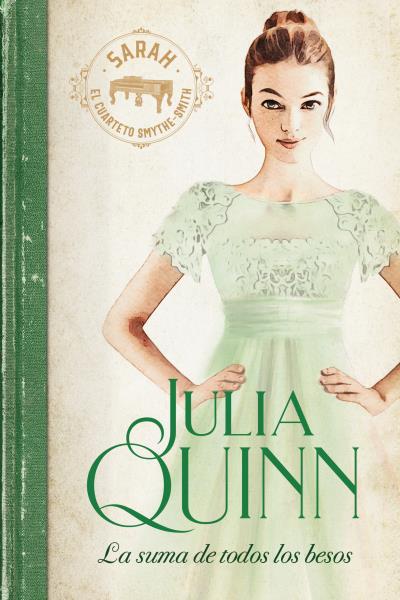
En Español
Not ready to order yours? Check out this story's overview. Read the excerpt. Listen to a bit on audio. Find out more about the series. There’s so much to love!
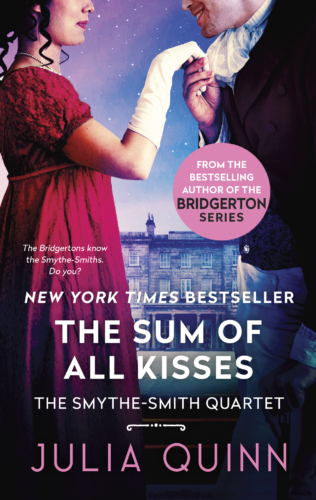




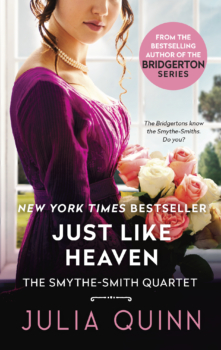
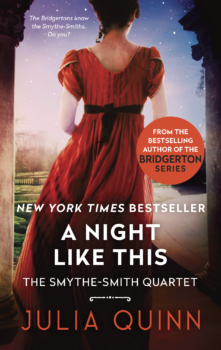
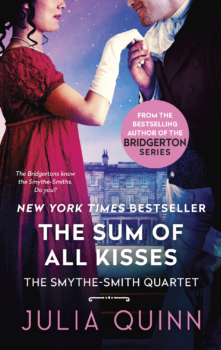
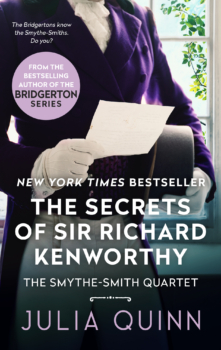
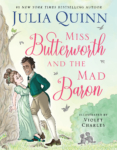



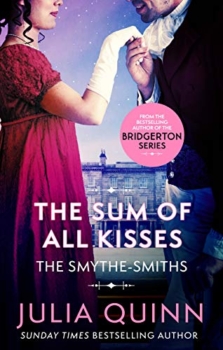
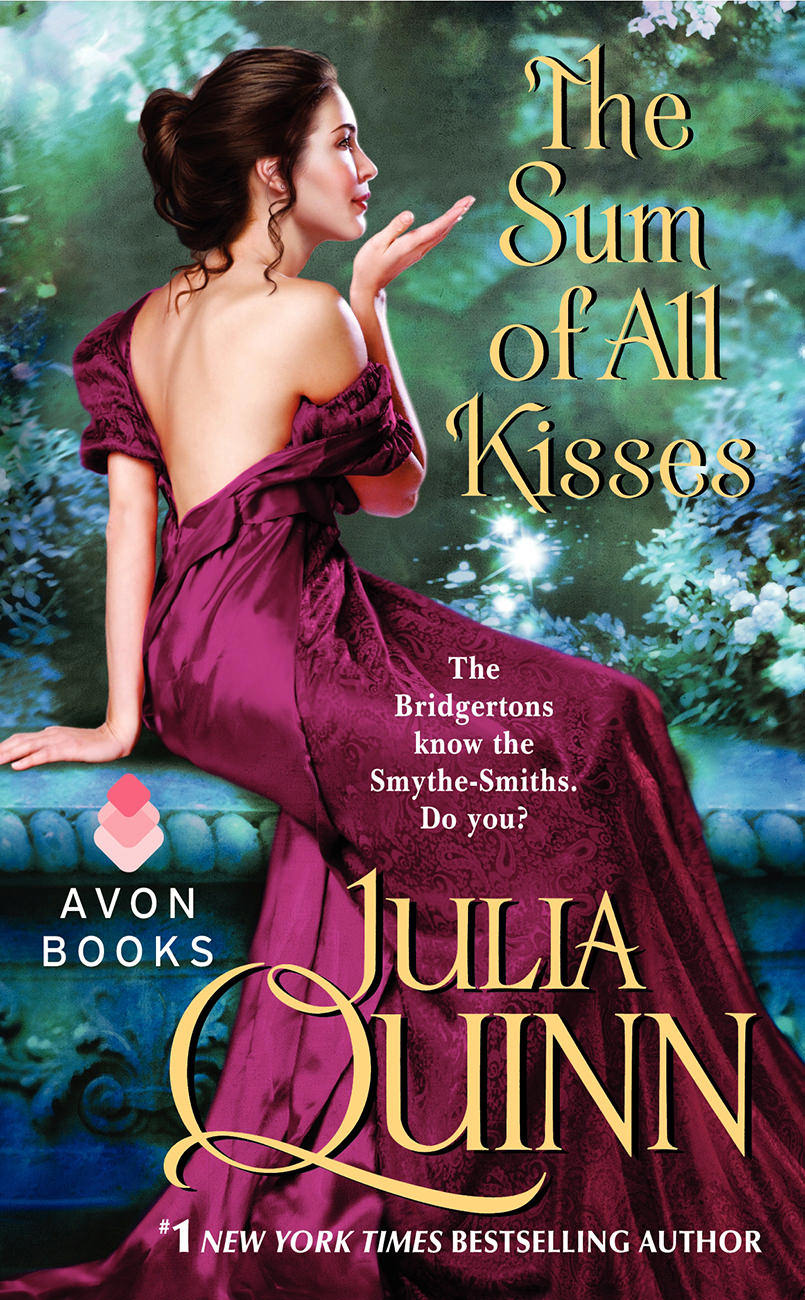
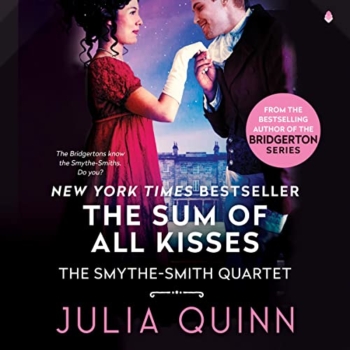

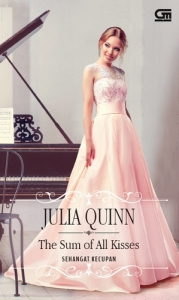
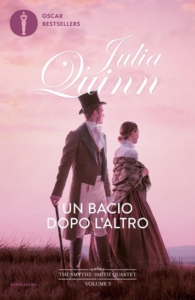
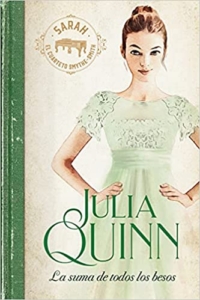
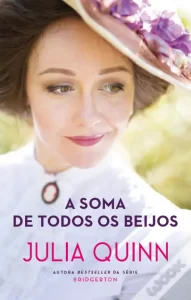
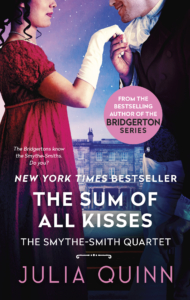
 Five weeks on the New York Times bestseller list, debuting at #3.
Five weeks on the New York Times bestseller list, debuting at #3. 

